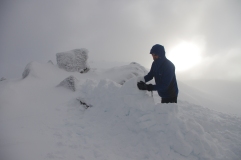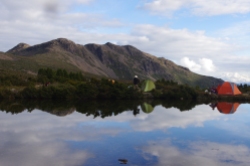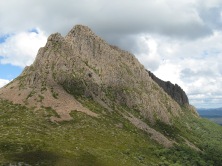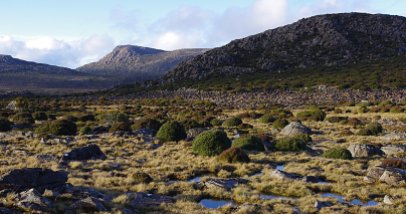Moora Moora, VIC
Why did you move where you live — what drew you to the place?
I started with a philosophy, not a place. I had the perfect job as a Research Scientist with the CSIRO: interesting and worthwhile work, the ability to make a difference in people’s lives, high pay, full security. The trouble was, my wife and I were aware that every dollar we spent fuelled the destruction of our children’s future. And any money we saved would be used by the banks to invest in the same destruction. Also, interesting as my job was, it required my attention 24/7, and to me my family was more important than my job. So, at 36 years of age, I retired. I’ve given the rationale for this at http://bobswriting.com/essay.html
When I decided to work for a sustainable future, I considered the tools available to me. I decided that I needed include in my personal life whatever I wanted to convince others to do. I had to build a microcosm of the world I intended to create.
In our crazy culture, there are two economic units: the nuclear family (or its fragments), and the corporation. One is way too small, the other way too large. A sustainable world needs to be based on economic units of about the size of a hunter-gatherer’s family about 12 to 60 people. So, for years we tried to set up some kind of cooperative living arrangement. In 1975 we found an existing group with very similar aims to ours. They had just bought land near Healesville, Victoria. This was the Moora Moora Cooperative. We joined in 1976, and moved on to the land at my ‘retirement’ in 1979.
So, initially the place was secondary. Anywhere would have done. But, within days after our move, I found myself doing the first creative manual work of my life: whittling some little wooden buttons for a baby’s cardigan. The land grabbed my soul, bound me to itself and became part of my being. We live on a mountain of power. My idea of a holiday is to stay at home.
Do you have a favourite place?

Where I am right now as I type. It is in a comfortable chair in the lounge room of the house I built with my own hands, looking out at flowers and fruit trees and rosellas and king parrots and occasionally, a wallaby.
What do you see as your life’s work?
From 1972 till about 1995 this was exclusively to create a sustainable future for my children, grandchildren and their grandchildren, and in this I include children who are not genetically related to me, children I’ll never meet. That passion is still there, and still guides everything I do and how I do it.
As I said, I started as a scientist, and I still think like one. The science I was trained in is psychology, and in the ‘90s I retrained myself to use my knowledge to help reduce distress. I have become a counselling psychologist. People come to me full of despair, feeling hopeless and helpless, and go away empowered, in charge of their destiny. So, this also gives meaning to my life.
Actually, the two missions are more than complementary: they are ying and yang of the same thing. My clients are casualties of the crazy society I want to transform. One part of my work sticks band aids on wounds of the soul. The other part is to create a future in which such wounds are not inflicted.
What influences have had the greatest impact on you as a person?
I was born while the bombs were falling. I had a stepfather who emotionally abused me, and an uncle I despised and used as a model of how not to be. Wherever I went, whatever I did, I was victimised and bullied. Although I rejected the abuse and fought against it, I also internalised it. I found that the only time I was not intensely miserable was when I went for a good long run, or when I immersed myself in study, in which I include reading almost anything.
So, all my life, I have been passionate about fighting injustice, being on the side of the victim, on defying the odds. As a child, I was a guerrilla fighter against my stepfather. I am still a guerrilla fighter against my step-culture. This is the technological society that is destroying all that makes life worth living, and the very basis of life on this little planet.
What gives you most joy?
The list is too long to give here…
Having fun with little kids.
Watching birds.
Being still and enjoying what Jon Kabat-Zinn calls the Nowscape.
Listening to Chopin.
Having a client move from suicidal despair to hope in a single session.
Achieving a task I didn’t think I could do.
Writing fiction.
Who are the people you most admire?
Gandhi, Mandela, the Dalai Lama, the Buddha, Jesus — all non-violent freedom fighters.
I have a friend, Siegfried Guttbrod. He became a very high level business executive as a young man, then gave it away. For 22 years, he devoted his life to working with people dying of cancer and their families. In 2005, this became too tame for him, and he went to South Africa to work with HIV positive kids, both of whose parents had died of AIDS. I think he belongs in the above category too.
My wife Jolanda, who has shaped me and is always giving, supporting those in need not because it’s what should be done, but because it is natural to her: “Of course you do that.” She is always doing something creative, and gets joy out of making something lovely for someone.
My three kids, who each in their own way, are models for me to follow. Incidentally, I am a ‘zero population growth’ person. I consented to having a third child only after a friend with only one said that we could have her quota.
What gives you hope?
The forces of destruction grow exponentially, like compound interest. It is my hope that we can make the trends to sustainability also grow exponentially, at a higher rate. If we can do this, there may be a future.
Second, I don’t need to have either hope or fear. What is, is, and it’s all right. I need to do my best, but am not bound by the outcome.
I can explain this through a story. Last year, I dislocated a shoulder, and it’s not something I recommend. Some 8 weeks into my recovery, the physio’s homework for me was to play basketball with myself. Bouncing the ball, shooting for a goal, catching the ball whichever way it went was excellent exercise for my damaged shoulder.
OK, I shoot for the basket, and the ball goes through the ring. Beauty. I shoot again and miss. Is there a difference?
That’s a model for life. We are not on this planet to achieve things, but to work toward our spiritual development by doing our best. Nothing matters but two things: what you take with yourself when you die — the lessons you have learned, your growth in compassion, wisdom and maturity — and what you leave behind in the hearts of others.
So, if I have done everything I can to create a world where everyone can live in dignity and reasonable security, then I have done OK, even if I completely fail and we end up with a catastrophe that wipes out all humanity. The journey matters, not the destination.
Whereabouts on the optimist-pessimist spectrum do you put yourself when it comes to the future of our planet?
Optimism and pessimism are both irrational. One is undue hope in the face of the evidence. The other is undue hopelessness in the face of the evidence. I prefer to base my judgments on the evidence.
That evidence is grim. If current trends continue as they are, we can pretty well guarantee death for billions of people within the next 5 to 10 years, and the destruction of civilisation for the rest. This is not pessimism, but realism. The evidence is there, but people, including even experts in the relevant sciences, are being optimistic. The reason is that it’s just too scary. I can face up to it, because as I said above, I am not scared.
Can we prevent disaster? No, because it has already started. The 173 Victorians killed by the Black Saturday fires were killed by climate change. An Alaskan village has had to be relocated because the houses were falling into the sea as the permafrost melted. Orang-utans in Borneo can no longer form child-rearing units because of commercial rainforest rape. African elephants and Bengal tigers are endangered, and will probably become extinct. These people are unable to speak a human language, but they deserve their lives too. Landslips that bury villages in mud slides, floods and droughts and wildfires and cyclones are all affected by climate change, and they have devastated humans and other people.
We can mitigate climate change, reduce the generation of deadly pollutants, nourish and maintain soil and water and other essentials of life. We can work to adapt life to cope with the changes that are inevitably on the way, that are here already. As I said, if the growth toward sanity can overtake the current growth toward insanity, then we have a hope of salvaging something, of creating the seed of a decent future.
But this needs a complete culture change. It means rejecting greed as the primary motive force.
We can do it in principle. In practice?























































May 19, 2013 at 7:09 pm
I was heartened by the Pope’s message yesterday, and he is not someone I usually hold in high regard. He said that we are run by money and have to move on from the worship of it. Greed is definitely not good. If only our politicians could see that life not all about money.